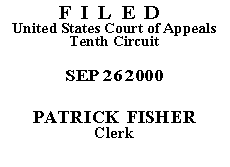

| DERRICK LAW,
Plaintiff-Appellant, v. MICHAEL PUGH, Warden, in his official and individual capacities; J. LORENZINI, Camp Administrator, in his official and individual capacities; G. LYDE, Unit Manager, in his official and individual capacities, Defendants-Appellees. |
|
Plaintiff Derrick Law, a federal inmate, appeals from the district court's grant of summary judgment to defendants and the denial of his subsequent motion for relief from judgment, filed pursuant to Fed. R. Civ. P. 60(b). His original complaint sought relief from alleged constitutional violations with respect to his prison work assignment and recompense for a radio which was confiscated and ultimately destroyed. The magistrate judge recommended that Law's claims be denied, and the district court adopted that recommendation.
In so doing, the district court noted that Law had failed to timely file objections to the magistrate judge's recommendations, and applied waiver. See Moore v. United States, 950 F.2d 656, 659 (10th Cir 1991). Law contends that he mailed a request for extension of time to the district court within the required time, and appellees concede that they received a copy of such motion with the time period. See Appellees' Br. at 9. We agree with appellees that, under the facts of this case, waiver should not be applied to preclude consideration of Law's claims on appeal. See Moore, 950 F.2d at 659 (stating that waiver "need not be applied when the interests of justice so dictate").
Because plaintiff proceeds pro se, we are obliged to construe his pleadings liberally. See Haines v. Kerner, 404 U.S. 519, 520-21 (1972). We review the district court's grant of summary judgment de novo, applying the same standard used by that court. See Simms v. Oklahoma ex rel. Dep't of Mental Health & Substance Abuse Servs., 165 F.3d 1321, 1326 (10th Cir.), cert. denied, 120 S. Ct. 53 (1999). We review the court's later denial of Law's Rule 60(b) motion for abuse of discretion only. See Woodworker's Supply Inc. v. Principal Mut. Life Ins. Co., 170 F.3d 985, 992 (10th Cir. 1999).
After careful consideration of Law's claims on appeal and review of the appellate record in light of applicable law and the above standards, we conclude that the district court correctly granted summary judgment to defendants and denied Law's motion for relief from judgment. Therefore, for substantially the same reasons set out in the magistrate judge's recommendations dated September 21, 1999, the judgment of the United States District Court for the District of Colorado is AFFIRMED.
Entered for the Court
Circuit Judge
*. This order and judgment is not binding precedent, except under the doctrines of law of the case, res judicata, and collateral estoppel. The court generally disfavors the citation of orders and judgments; nevertheless, an order and judgment may be cited under the terms and conditions of 10th Cir. R. 36.3.